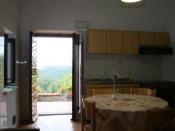The development of agrotourism in Cyprus
The challenges facing the tourism industry in Cyprus have not gone unrecognised by the authorities. In mid-1980s, when it became evident that the development of tourism was becoming, in a sense, too successful, measures were introduced to re-focus the direction and scale of tourism development away from the burgeoning coastal resorts. In particular, policies were introduced which aimed to encourage tourism development in the traditional hill resorts, backed up by marketing strategies designed to attract more diverse, middle to upper income tourists (Andronikou, 1986).
Since then, successive plans and policies have sought, albeit with limited success, to achieve a more balanced approach to tourism, implicit objectives being to slow the growth in tourism; to improve and diversify the tourism product; to attract higher-spending tourists; to reduce the impacts of seasonality; and, to spread the benefits of tourism around the island. Over the last decade, the principal vehicle for achieving these objectives has been the development of agrotourism.
The agrotourism programme in Cyprus, launched by the CTO in 1991, is designed primarily to facilitate the socio-economic regeneration of rural areas in Cyprus. More specifically, the programme seeks to:
*revitalise rural communities in order to counter out-migration,
*channel a more significant proportion of tourism income directly to rural communities,
*diversify the Cypriot tourism product by providing an alternative to the beach holidays and by attracting new, specialised segments of the tourist market,
*develop a uniquely Cypriot product based on traditional rural culture and philoxeniaïïCypriot hospitality,
*protect and conserve existing natural and built environments and to preserve and strengthen traditional lifestyle and culture (PIO, 1999).
In short, agrotourism in Cyprus embraces the `typical' socio-economic aims of rural tourism development. It is not intended as an alternative to traditional rural occupations or lifestyles, but rather as...


